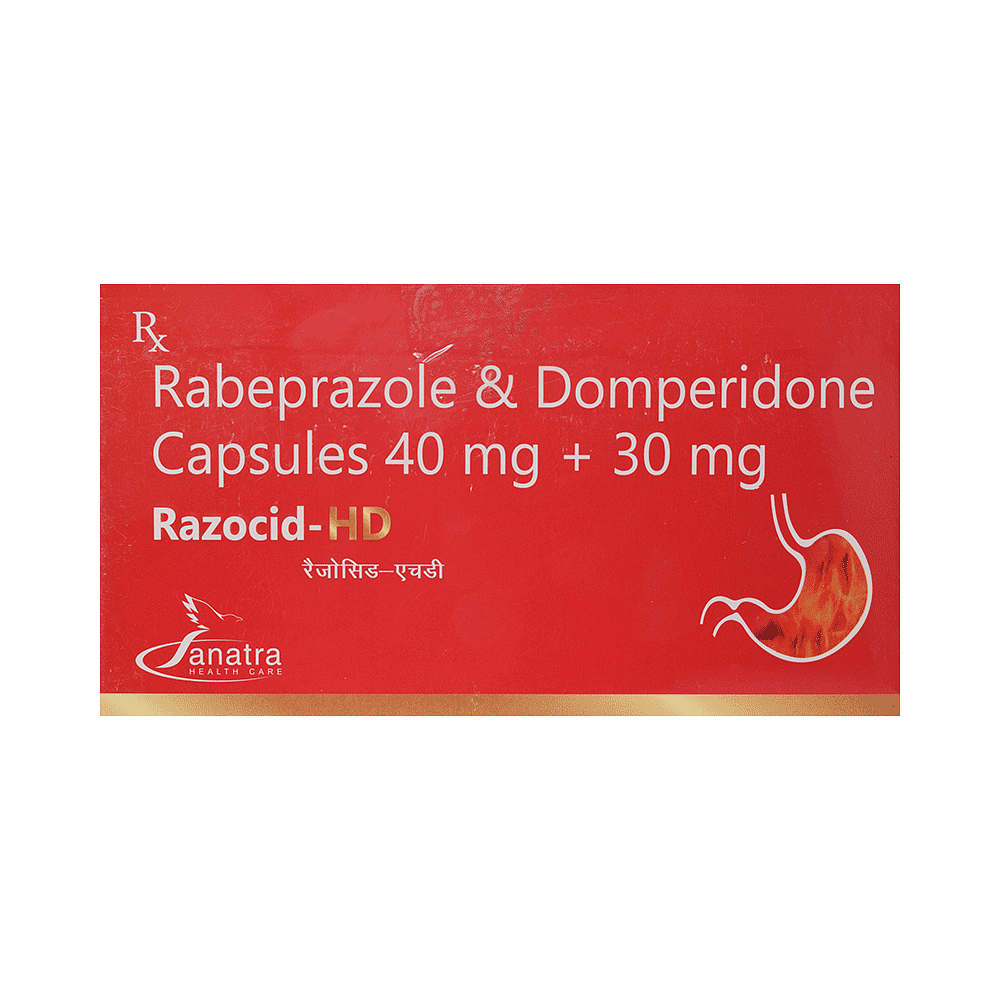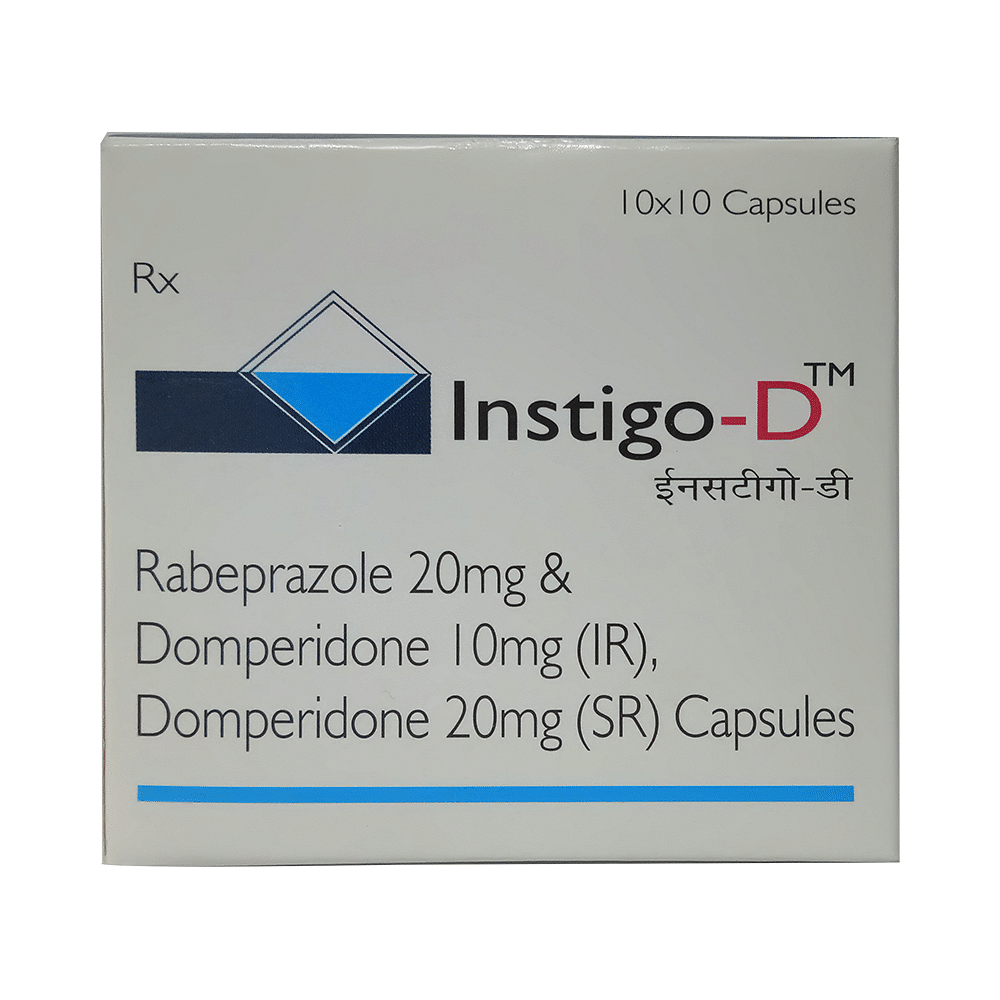
Rabebox D 30mg/20mg Tablet
Manufacturer
Elgoog Health Series
Salt Composition
Domperidone (30mg) + Rabeprazole (20mg)
Key Information
Short Description
Rabebox D 30mg/20mg Tablet is a combination medicine used to treat gastroesophageal reflux disease (Acid reflux). It works by relieving the symptoms of acidity such as heartburn, stomach pain, or irritation.
Dosage Form
Tablet
Introduction
Rabebox D 30mg/20mg Tablet is a combination of two medicines: Domperidone and Rabeprazole. It works by relieving the symptoms of acidity such as heartburn, stomach pain, or irritation. It also neutralizes the acid and promotes easy passage of gas to reduce stomach discomfort.
Directions for Use
Take this medicine in the dose and duration as advised by your doctor. Swallow it as a whole. Do not chew, crush or break it. Rabebox D 30mg/20mg Tablet is to be taken empty stomach.
Safety Information
Side Effects
No common side effects listed.
Alcohol Warning
Caution is advised when consuming alcohol with Rabebox D 30mg/20mg Tablet. Please consult your doctor.
Breastfeeding Warning
Rabebox D 30mg/20mg Tablet is probably unsafe to use during breastfeeding. Limited human data suggests that the drug may pass into the breastmilk and harm the baby.
Pregnancy Warning
Rabebox D 30mg/20mg Tablet may be unsafe to use during pregnancy. Although there are limited studies in humans, animal studies have shown harmful effects on the developing baby. Your doctor will weigh the benefits and any potential risks before prescribing it to you. Please consult your doctor.
How it works
Rabebox D 30mg/20mg Tablet is a combination of two medicines: Domperidone and Rabeprazole. Domperidone is a prokinetic which works on the upper digestive tract to increase the movement of the stomach and intestines allowing the food to move more easily through the stomach. Rabeprazole is a proton pump inhibitor (PPI) which works by reducing the amount of acid in the stomach which helps in the relief of acid-related indigestion and heartburn.
Quick Tips
You have been prescribed Rabebox D 30mg/20mg Tablet for the treatment of acidity and heartburn. Take it one hour before the meal, preferably in the morning. Inform your doctor if you get watery diarrhea, fever or stomach pain that does not go away. Inform your doctor if you do not feel better after taking it for 14 days as you may be suffering from some other problem that needs attention. Long-term use can cause weak bones and deficiency of minerals such as magnesium. Take adequate dietary intake of calcium and magnesium or their supplements as prescribed by your doctor.
Related Medicines

R Od Plus 30mg/20mg Tablet

Patrab D 30mg/20mg Tablet

Rabizon-D Tablet

Rableck D 30mg/20mg Tablet

Regulas D 30mg/20mg Tablet

Barec D 30mg/20mg Tablet

Razocid-HD Tablet

Zegzen D 30mg/20mg Tablet

Zarirab D 30mg/20mg Tablet

Instigo-D Tablet
Frequently asked questions
What is Rabebox D 30mg/20mg Tablet?
Rabebox D 30mg/20mg Tablet is a combination medication containing Domperidone and Rabeprazole. It is used to treat acidity, heartburn, gastroesophageal reflux disease (GERD), and gastric or duodenal ulcers. Domperidone helps control vomiting by increasing gut motility.
What are the contraindications of Rabebox D 30mg/20mg Tablet?
Rabebox D 30mg/20mg Tablet is contraindicated in patients with a known hypersensitivity to rabeprazole or domperidone, or any other inactive ingredients. Caution is advised for patients with underlying kidney or liver disease.
Can the use of Rabebox D 30mg/20mg Tablet cause dry mouth?
Yes, Rabebox D 30mg/20mg Tablet can cause dry mouth due to Domperidone. To manage this side effect, drink plenty of water, keep some on your bedside at night, reduce alcohol intake, and avoid smoking. Use an alcohol-free mouthwash if you have dry mouth.
Can the use of Rabebox D 30mg/20mg Tablet cause diarrhea?
Yes, Rabebox D 30mg/20mg Tablet can cause diarrhea. If you experience diarrhea, drink plenty of water or other fluids and avoid taking fatty or fried foods with this medication. Consult your doctor if diarrhea persists and signs of dehydration appear.
What is the recommended storage condition for Rabebox D 30mg/20mg Tablet?
Keep Rabebox D 30mg/20mg Tablet in its original container, tightly closed. Store it as directed on the packaging label. Dispose of unused medication properly and ensure it's not accessible to pets, children, or other individuals.
Is it safe to use Rabebox D 30mg/20mg Tablet?
Yes, Rabebox D 30mg/20mg Tablet is generally safe for most patients. However, some may experience common side effects like diarrhea, stomach pain, flatulence, dry mouth, dizziness, headache, and other uncommon or rare side effects. Inform your doctor if you have any persistent issues while taking this medication.
What is the best time to take Rabebox D 30mg/20mg Tablet?
It's recommended to take Rabebox D 30mg/20mg Tablet before the first meal of the day or on an empty stomach.
Can the use of Rabebox D 30mg/20mg Tablet cause abnormal heartbeat?
Yes, Rabebox D 30mg/20mg Tablet can increase the risk of developing irregular heartbeat (serious arrhythmias), which is a serious side effect but occurs rarely. The risk may be slightly higher in individuals over 60 years old.


